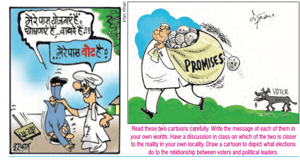Regular electoral competition provides incentives to political parties and leaders.
Important Questions on Electoral Politics
Once the election results were announced, the sitting Chief Minister resigned. The newly elected Members of Legislative Assembly (MLAs) of Lok Dal chose Devi Lal as their leader. The Governor invited Devi Lal to be the new Chief Minister. Three days after the election results were declared, he became the Chief Minister. As soon as he became the Chief Minister, his Government issued a Government Order waiving the outstanding loans of small farmers, agricultural labourers and small businessmen. His party ruled the State for four years. The next elections were held in 1991. But this time his party did not win popular support. The Congress won the election and formed the government.
Jagdeep and Navpreet read this story and drew the following conclusions. Can you say which of these are right or wrong (or if the information given in the story is inadequate to call them right or wrong):
(a) Elections can lead to changes in the policy of the government.
(b) The Governor invited Devi Lal to become the Chief Minister because he was impressed with his speeches.
(c) People are unhappy with every ruling party and vote against it in the next election.
(d) The party that wins the election forms the government.
(e) This election led to a lot of economic development in Haryana.
(f) The Congress Chief Minister need not have resigned after his party lost elections.
Read the statements below carefully and choose the correct option.
Statement 1: In an election, representatives of political parties choose who will form the government.
Statement 2: Elections can only be carried out in democracies.
Statement 3: Political parties and their candidates never use dirty tricks to win elections.
Read these cartoons carefully and write if they are close to reality also about the relationship between the voters and political leaders.

What makes an election democratic?
(a) Everyone should have one vote and every vote have an equal value.
(b) Elections must be held after every years.
(c) Candidates preferred by the people should get elected.
(d) Free and fair elections.
Select the correct answer using the codes given below:
The table below gives the proportion of different communities among the candidates who won elections to the US Congress. Compare these to the proportion of these communities in the population of the US.
Based on this, would you suggest a system of reservations in the US Congress? If yes, why and for which communities? If no, why not?
Proportion of the community(in percent)
| Population Proportion | Population of US | Population of US |
| Black | ||
| Hispanic | ||
| White |
Read the statements below carefully and choose the correct option.
Statement : Voters list should be updated as some people may have moved away from the area where they had last voted.
Statement : The Election Commission is headed by the Prime Minister.
Statement : Elections enable people to assess the performance of the judiciary.

